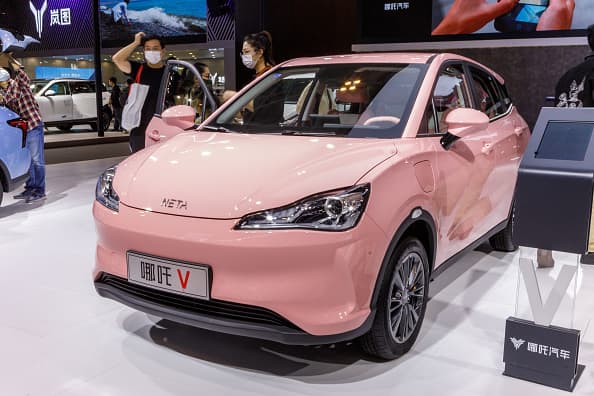BEIJING — Tesla and BYD remained by far the market leaders in China’s electric car market in 2021, while new competitors emerged against smaller rivals like Nio, according to the China Passenger Car Association.
Budget electric car Hongguang Mini retained the best-selling spot — more than tripling sales last year to 395,451 units, the association data showed Thursday.
But more expensive cars from Tesla and BYD dominated the top vehicles sold in the new energy vehicle category, which includes battery-powered and hybrid cars.
Here’s the list of top 15 best-selling new energy passenger cars, including SUVs, in China for 2021:
1. Hongguan Mini (SAIC-GM-Wuling)
2. Qin (BYD)
3. Model Y (Tesla)
4. Model 3 (Tesla)
5. Han (BYD)
6. Song (BYD)
7. Li One (Li Auto)
8. eQ (Chery)
9. Benben EV (Changan)
10. Aion S (GAC Motor spin-off)
11. Ora Black Cat (Great Wall Motor)
12. P7 (Xpeng)
13. Tang (BYD)
14. Ora Good Cat (Great Wall Motor)
15. Nezha V (Hozon Auto)
Three BYD models ranked among the top 10, with the BYD Qin sedan reaching sales of 187,227 units — and outselling all Tesla models.
Close behind the BYD Qin was Tesla’s Model Y, which launched in China last year and leaped to the top of the high-end new energy SUV category with 169,853 units sold in 2021, according to the association.
Tesla’s Model 3 came next, with 150,890 units sold last year, up nearly 10% from 2020, the data showed.
Some in China’s auto industry have cast doubt on the accuracy of the association’s figures. But the numbers can reflect broader trends.
Li Auto‘s hybrid Li One made the top 10 list of new energy passenger cars, while Xpeng‘s P7 sedan made the top 15.
A relatively newcomer to the market, the low-priced, fully electric Nezha V SUV took 15th place, and pushed three far more expensive Nio models even lower in the sales rankings.
Nezha is a brand under start-up Hozon Auto, and closed a 4 billion yuan ($625 million) funding round in the fourth quarter. Prices for the Nezha V start at 62,900 yuan ($9,722) after subsidies. In comparison, Nio’s ES6 SUV starts at 346,660 yuan after subsidies.
Competition in China’s electric vehicle market is set to heat up further this year, with Huawei’s co-developed Aito M5 due to begin deliveries next month and two Nio sedans coming later in the year.
Sales of new energy vehicles have grown rapidly while that of passenger cars overall have fallen in the last several months as China’s consumer spending slumped.
In all, nearly 3 million new energy passenger cars were sold in China last year, accounting for 14.8% of the 20.15 million passenger cars sold overall, according to the association’s data.
That ratio is moving closer to Beijing’s aim to have new energy vehicles make up 20% of new cars sold by 2025.
